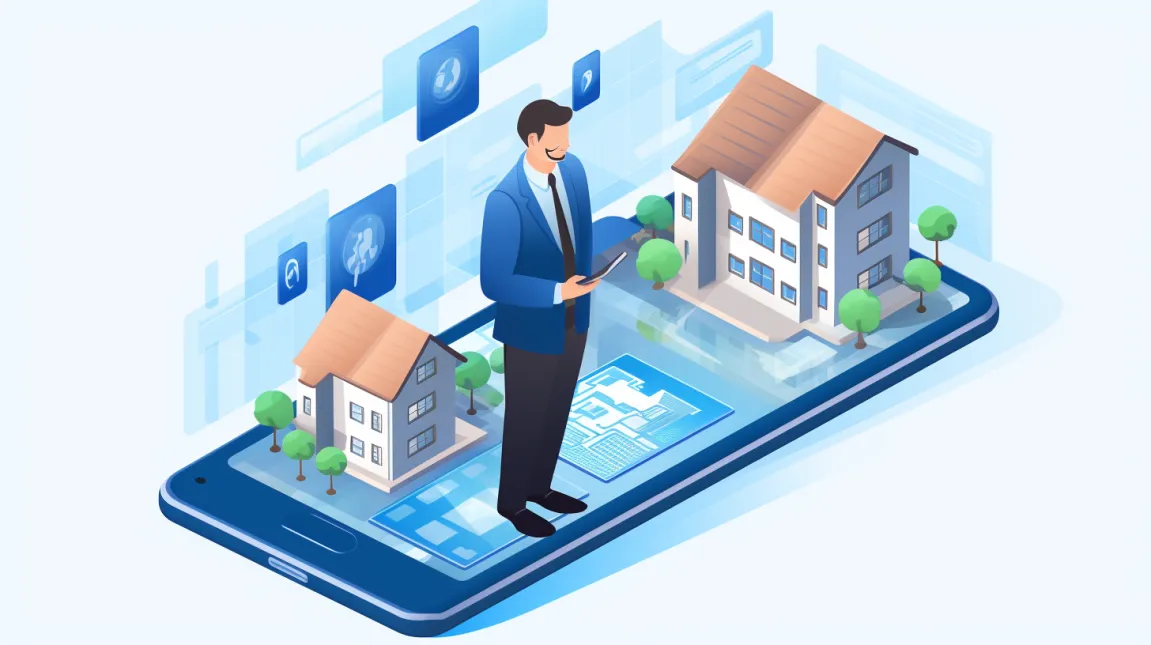Table of Contents
Imagine a world where buying a house is as simple as ordering a pizza – welcome to the future of real estate app development. Over the years, the real estate industry has evolved dramatically. From the days when property dealings were carried out through personal connections and brokers, we have now entered an era where technology is reshaping the way we buy, sell, and invest in real estate.
The main purpose of this blog post is to delve into the world of real estate app development, exploring the trends that are shaping this landscape, the challenges that developers face, and the opportunities that lie ahead. This exploration is vital because real estate apps are not just a trend; they are becoming a necessity. They are transforming the industry, making it more accessible, efficient, and user-friendly.
In the following sections, we will discuss the benefits of real estate app development and how it is revolutionizing the industry. We will explore the current trends in this field, the opportunities that the future holds, and the challenges and risks that developers need to overcome.
So, buckle up and join us as we navigate through the exciting world of real estate app development.
The Benefits of Real Estate App Development
In the digital age, real estate apps are revolutionizing the way buyers, sellers, agents, and investors navigate the real estate process. These intuitive platforms offer a plethora of benefits that streamline and simplify various aspects of the real estate industry.
Buyers can now explore potential homes from the comfort of their living room, using advanced search filters to narrow down their preferences. Sellers, on the other hand, can list their properties with ease and reach a broader audience than traditional methods would allow. For agents, real estate apps provide an efficient way to manage listings, connect with clients, and close deals. Investors can leverage these platforms to analyze market trends, identify investment opportunities, and track their portfolio performance.
Several successful real estate apps have set the standard for what users expect from these platforms. Zillow, for instance, offers an extensive database of residential and commercial properties across the United States. Its features include 3D home tours, price history, mortgage calculators, and neighborhood details.
Realtor.com is another prominent app that provides comprehensive real estate listings, along with tools for property comparison, mortgage management, and customized notifications.
The advantages of real estate apps over traditional methods of real estate transactions are manifold.
- They offer greater convenience, as users can access real estate services anytime, anywhere.
- They also provide a wealth of information at users’ fingertips, helping them make informed decisions.
- Moreover, real estate apps foster transparency in transactions, as they provide real-time updates, user reviews, and detailed property reports.
The real estate app development is not merely a trend; it’s a significant shift in the way the real estate industry operates. It offers numerous benefits to all stakeholders involved, making the real estate process more efficient, accessible, and user-friendly.
The Current Trends in Real Estate App Development

The landscape of real estate app development is undergoing a significant transformation, with new developments and innovations emerging at a rapid pace. These advancements are not only changing the way real estate transactions are conducted but are also reshaping the expectations of buyers, sellers, agents, and investors.
One of the most notable trends in real estate app development is the integration of augmented reality (AR) and virtual reality (VR) technologies. These technologies allow potential buyers and renters to virtually tour properties from the comfort of their own homes, thereby saving time and resources. Apps like Zillow and Realtor.com have already begun to leverage these technologies, providing immersive, 360-degree property views to their users.
Another key trend is the use of artificial intelligence (AI) and machine learning (ML) to personalize user experiences and streamline property search processes. These technologies enable apps to analyze user behavior and preferences, predict their needs, and provide tailored property recommendations. They also automate various tasks, such as scheduling property viewings and answering common queries, thereby enhancing efficiency and user satisfaction.
Blockchain technology is also making its way into real estate app development. It is being used to create transparent, secure, and efficient platforms for property transactions. Blockchain-based apps can facilitate peer-to-peer property sales and rentals, eliminate intermediaries, and reduce transaction costs.
The demand and popularity of real estate apps are driven by several key factors.
- Firstly, the increasing digitization and mobile usage are boosting the adoption of real estate apps.
- Secondly, the convenience, efficiency, and personalized experiences offered by these apps are attracting more users.
- Lastly, the ongoing COVID-19 pandemic has accelerated the shift towards digital real estate transactions, further fueling the growth of real estate apps.
The market for real estate app development is expanding rapidly. The market is segmented based on product type (ERP, CRM, PMS, etc.), deployment type (on-premise, cloud), and region. North America holds the largest market share, followed by Europe and Asia-Pacific.
The current trends in real estate app development indicate a promising future for this sector. As technology continues to evolve and user expectations continue to rise, real estate apps are set to become an integral part of the real estate industry.
The Future Opportunities in Real Estate App Development

As we look ahead, the future of real estate app development is brimming with opportunities. The combination of technological advancements and changing consumer behaviors is expected to drive new trends and directions in this domain.
One of the most anticipated trends is the integration of artificial intelligence (AI) and machine learning (ML) in real estate apps. These technologies can help automate and streamline various aspects of the real estate process, such as property search, price estimation, and negotiation. They can also provide personalized and predictive insights to users based on their preferences, behaviors, market trends, and current mortgage rates.
Another promising direction is the use of augmented reality (AR) and virtual reality (VR) in real estate apps. These technologies can provide immersive and interactive experiences to users, allowing them to virtually tour, inspect, and customize properties from the comfort of their homes. This can significantly enhance the convenience, efficiency, and satisfaction of the real estate process.
Moreover, the rise of blockchain and smart contracts can revolutionize the transparency, security, and efficiency of real estate transactions. These technologies can facilitate peer-to-peer transactions, eliminate intermediaries, and automate contractual obligations, thus reducing costs, risks, and time.
In terms of applications and use cases, real estate apps can extend beyond the traditional buying and selling of properties. They can serve various scenarios and domains, such as property management, home services, neighborhood communities, real estate education, and investment crowdfunding. They can also cater to different user segments, such as first-time homebuyers, professional investors, overseas buyers, and renters.
- To develop successful real estate apps, there are several tips and best practices to consider.
- First, understand your target users and their needs, preferences, and pain points.
- Second, design a user-friendly interface and a seamless user experience.
- Third, offer unique and valuable features that differentiate your app from the competition.
- Fourth, ensure the privacy, security, and reliability of your app.
- Lastly, continuously update and improve your app based on user feedback and market changes.
The future of real estate app development is full of potential and excitement. By embracing the upcoming trends and seizing emerging opportunities, real estate app developers can create innovative and impactful solutions that transform the real estate industry and benefit all stakeholders.
The Challenges and Risks in Real Estate App Development

In the pursuit of innovation and progress in the real estate industry, it is crucial to acknowledge the difficulties and obstacles that real estate app developers face. The path to creating a successful and useful real estate app is fraught with challenges and risks that can significantly impact the development process and the final product.
- One of the most common challenges in real estate app development is ensuring security. With a vast amount of sensitive information being exchanged, apps must provide robust security measures to protect user data. Breaches can lead to significant losses and damage to the app’s reputation.
- Privacy is another critical concern. Users need to be confident that their personal information will not be misused or disclosed without their consent. Developers must adhere to strict privacy regulations and standards to maintain user trust and avoid legal complications.
- Regulation is another hurdle that developers must overcome. The real estate industry is heavily regulated, and apps must comply with a myriad of legal requirements and standards. Navigating these regulations can be complex and time-consuming, potentially slowing down the development process.
- Competition in the real estate app market is fierce. With many apps offering similar features and services, standing out from the crowd is a significant challenge. Developers must continually innovate and improve their apps to stay ahead of their competitors and attract users.
- Finally, user satisfaction is a critical factor in the success of a real estate app. Developers must ensure that their app is user-friendly, reliable, and meets the needs and expectations of their users. Receiving negative feedback or ratings can significantly impact an app’s success and reputation.
Despite these challenges and risks, there are strategies that developers can employ to mitigate them. For security and privacy concerns, implementing advanced encryption techniques and robust data protection measures can help safeguard user information. Regularly updating and testing the app can also help identify and fix any security vulnerabilities.
To navigate regulatory challenges, developers can seek legal advice to ensure their app complies with all necessary regulations. Keeping up to date with changes in the law can also help avoid any compliance issues.
In terms of competition, developers can differentiate their apps by offering unique features or services. Conducting market research can help identify gaps in the market and user needs that are not being met by existing apps.
To improve user satisfaction, developers should focus on creating an intuitive and user-friendly interface. Regularly gathering and responding to user feedback can also help identify areas for improvement and enhance the user experience.
While real estate app development presents several challenges and risks, with the right strategies and approaches, these can be effectively managed and overcome. The potential benefits and opportunities in this field far outweigh the challenges, making it a worthwhile endeavor for developers and businesses alike.
Conclusion
In this comprehensive exploration of the future of real estate app development, we have delved into the numerous benefits these apps bring to the table for all stakeholders involved in the real estate process. From aiding buyers and sellers to supporting agents and investors, real estate apps have revolutionized the traditional methods of conducting real estate transactions.
We have also examined the current trends shaping the landscape of real estate app development, highlighting the key factors driving their demand and popularity. The market’s size, growth, and segmentation further underline the significance of these apps in today’s digital age.
Looking ahead, we have forecasted the potential opportunities that lie in the realm of real estate app development. The future promises exciting prospects with new applications and use cases emerging in various scenarios and domains. However, it is important to note that this path is not devoid of challenges and risks. Issues surrounding security, privacy, regulation, competition, and user satisfaction pose considerable hurdles for developers.
Nevertheless, the value and importance of real estate app development cannot be overstated. In an increasingly digital world, these apps represent a vital tool for navigating the complex real estate market. As we move forward, it is our responsibility to continue innovating, overcoming challenges, and seizing opportunities to ensure the continued growth and success of real estate app development.
As a final note, we urge all stakeholders, whether you are a developer, investor, agent, or user, to embrace digital transformation in the real estate industry. Stay updated with the latest trends, be open to new opportunities, and strive to make the most of the technological advancements in this field. The future of real estate is digital, and it is here to stay.





